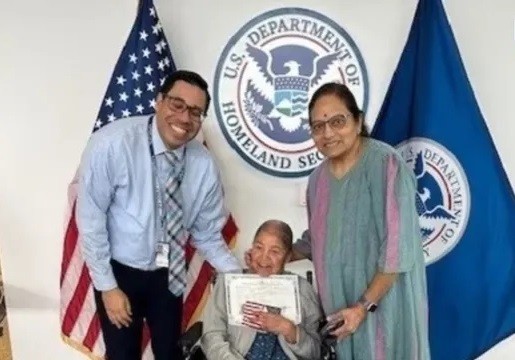06/04/2024
06/04/2024

NEW YORK, April 6: In a heartening tale amid the ongoing immigration debates, a 99-year-old woman named Daibai has achieved a significant milestone by becoming a US citizen. Born in India in 1925, Daibai now resides in Orlando, Florida, with her daughter.
Daibai's journey to naturalization serves as a poignant reminder of the enduring allure of the United States as a land of opportunity and hope for many around the world. Her story garnered attention from the U.S. Citizenship and Immigration Services (USCIS), who shared information about her naturalization on their official Twitter account. "Daibai is from India and was excited to take the Oath of Allegiance," the post read, accompanied by an image of Daibai holding her naturalization certificate alongside her daughter, with a USCIS officer presiding over the ceremony.
The process of naturalization, marked by the issuance of the Certificate of Naturalization, symbolizes an individual's transition to U.S. citizenship. For Daibai, this achievement represents the culmination of a lifelong dream and underscores the diverse paths individuals take to become American citizens.
However, Daibai's story has also ignited discussions among netizens about the accessibility of the American dream and the challenges posed by immigration processes. Some questioned the value of citizenship for individuals at such an advanced age, while others drew parallels to the struggles faced by individuals in the employment-based green card backlog and H1B visa applicants.
The H1B visa, particularly, has been a point of contention, with wait times stretching beyond a century in recent days. Professionals in fields such as engineering, science, and journalism face arduous wait times for visa approval, leading to frustration and disillusionment among applicants.
Addressing these concerns, Varun Singh, MD-XIPHIAS Immigration, emphasized the importance of raising awareness about the adjustment of status benefits and advocated for enhancing visa processing efficiency. Nicholas A. Mastroianni III, President and CMO of the US Immigration Fund echoed similar sentiments, stressing the need for legislative reform to align visa policies with current economic needs while maintaining program integrity and transparency.
As Daibai's story continues to resonate, it serves as a poignant reminder of the diverse and complex landscape of immigration in the United States and the ongoing efforts to address its challenges.


